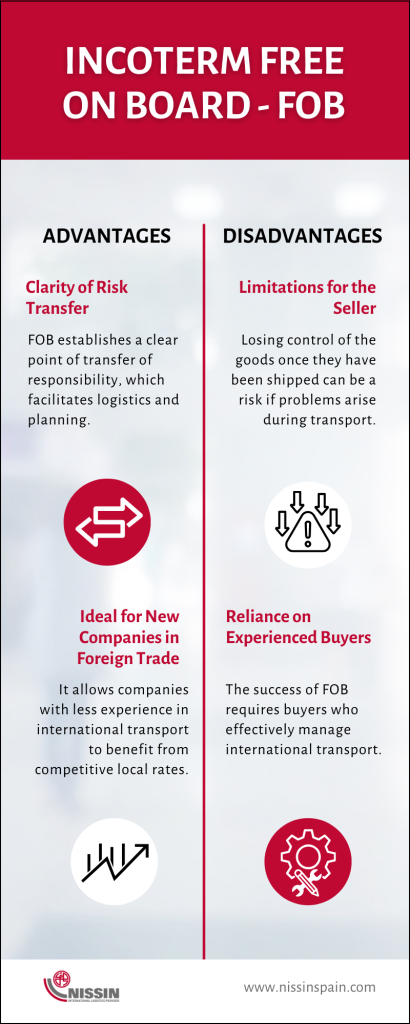The FOB Incoterm, which stands for “Free On Board”, plays a crucial role in international trade operations, establishing clear rules on the delivery of goods and the transfer of risks and responsibilities between the seller and the buyer. This term is fundamental to ensure efficient and clear management of global ocean operations.
Next, we take a closer look at the definition of FOB, its practical applications, advantages, disadvantages and key considerations for successful implementation.
What is the Incoterm FOB?
The term FOB is an international trade clause used exclusively for ocean or inland waterway transport. It defines that the seller is responsible for bringing the goods to the agreed port of loading and loading them onto the vessel. From that moment on, the buyer assumes responsibility for the goods, including transport insurance and customs charges at destination.
Key Responsibilities under FOB
- Seller: Covers all costs and procedures until the goods are loaded onto the vessel, including export customs clearance.
- Buyer: Responsible from the moment the goods are shipped, including insurance, international transport and import customs formalities.
Application and Challenges of FOB in Containerised Freight
Although FOB is common in the import of containerised cargo, especially from China, its application can be problematic due to ambiguity over the liability of the goods prior to loading onto the vessel. This has led to a debate on the adequacy of FOB for containerised cargo, with FCA being suggested as a clearer alternative.
Advantages and Disadvantages of FOB
Advantages
- Clarity of Risk Transfer: FOB establishes a clear point of transfer of responsibility, which facilitates logistics and planning.
- Ideal for Companies New to International Trade: Allows companies with less experience in international transport to benefit from competitive local rates.
Disadvantages
- Limitations for the Seller: Losing control of the goods once shipped can be a risk if problems arise during transport.
- Reliance on Experienced Buyers: Successful FOB requires buyers who effectively manage international transport.
Additional Considerations for Choosing FOB
The selection of FOB must be an informed decision, considering the particularities of each trade operation. It is essential to analyse both the logistical capacity and the specific needs of the transaction..
Logistical Strategies in the Use of FOB
Successful implementation of FOB requires a well-defined logistics strategy, which considers:
- Selecting the Port of Loading: Choosing the right port can significantly influence costs and lead times.
- Risk management: Taking out adequate insurance to cover possible damage or loss during transport is vital.
- Coordination with Freight Forwarders: Effective communication with freight forwarders ensures a smooth transition of responsibilities.
Impact of FOB on Trade Relationships
The use of FOB can strengthen business relationships by establishing clear roles and responsibilities, thus facilitating trust between the parties. It is crucial that both sellers and buyers understand their obligations to avoid misunderstandings and ensure successful transactions.
Navigating Common Challenges with FOB
Although FOB is widely used and recognised in international trade, companies face specific challenges that require attention and strategy to navigate efficiently. These include:
- Coordination at the Port of Loading: The logistics of delivering goods to the port and ensuring their proper loading onto the vessel can be complex, especially in ports with high volumes of traffic..
- Compliance with Export Regulations: The seller must ensure that all export regulations and requirements are met prior to loading, which can vary significantly from country to country.
- Carrier Selection and Rate Negotiation: Finding and choosing reliable and cost-effective transport companies requires detailed research and negotiation skills, which are essential to remain cost-competitive.
Best Practices for FOB Implementation
To maximise the benefits and minimise the risks associated with the FOB Incoterm, companies can follow several best practices:
- Education and Training: Ensure that procurement and logistics teams fully understand the implications of FOB, including responsibilities and risks.
- Detailed Assessment of Trading Partners: Conduct due diligence on trading partners to ensure their reliability and experience in handling FOB transactions.
- Use of Technology: Implementing technology solutions for cargo tracking and document management can increase efficiency and reduce the possibility of making errors.
- Contingency Planning: Developing contingency plans for potential delays or problems at the port can help minimise disruptions in the supply chain.
The Future of FOB in Global Trade
As international trade continues to evolve, so do incoterms such as FOB. Adapting to changes in regulation, technological innovation and market dynamics is essential to making the most of FOB. Companies that stay informed and adaptive are better positioned to navigate the complex landscape of international trade, taking advantage of the opportunities that FOB and other incoterms offer to facilitate efficient and effective global operations.
The FOB Incoterm is a valuable tool in international trade, especially for those involved in ocean transport. Although it has certain limitations, especially in the context of containerised cargo, its correct implementation can offer clarity and efficiency in the transfer of goods. It is important for companies to carefully assess their logistical needs and capabilities before opting for FOB, considering alternatives such as FCA where appropriate. With proper planning and a clear understanding of the responsibilities involved, the FOB Incoterm can be an excellent option for facilitating global trade, strengthening international operations and long-term business relationships.
In Nissin Transport GmbH, Sucursal en España, we understand the importance of adaptation and innovation in the dynamic global trade environment. We believe we are an essential strategic partner, offering adaptability in the midst of regulatory changes, technological innovation and market fluctuations. Our commitment to excellence and sustainability in international trade makes us the ideal choice for companies looking to optimise their operations under FOB incoterm and other trade terms.
For more information on how we can support your logistics and trade needs under the FOB Incoterm, we invite you to visit our web.






